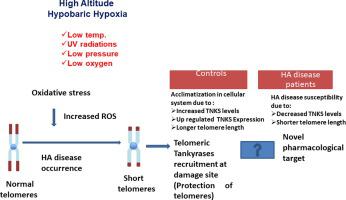Drug Discovery Today ( IF 7.4 ) Pub Date : 2021-07-22 , DOI: 10.1016/j.drudis.2021.07.012 Manjula Miglani 1 , Qadar Pasha 2 , Archana Gupta 3 , Anjali Priyadarshini 3 , Ramendra Pati Pandey 3 , Arpana Vibhuti 3

|
Cellular exposure to extreme environments leads to the expression of multiple proteins that participate in pathophysiological manifestations. Hypobaric hypoxia at high altitude (HA) generates reactive oxygen species (ROS) that can damage telomeres. Tankyrase (TNKS) belongs to multiple telomeric protein complexes and is actively involved in DNA damage repair. Although published research on TNKS indicates its possible role in cancer and other hypoxic diseases, its role in HA sicknesses remains elusive. Understanding the roles of telomeres, telomerase, and TNKS could ameliorate physiological issues experienced at HA. In addition, telomeric TNKS could be a potential biomarker in hypoxia-induced sicknesses or acclimatization. Thus, a new research avenue on TNKS linked to HA sickness might lead to the discovery of drugs for hypobaric hypoxia.
中文翻译:

种子药物发现:端粒tankyrase作为高海拔缺氧病理生理学的药理学靶点
细胞暴露于极端环境会导致参与病理生理表现的多种蛋白质的表达。高海拔 (HA) 的低压缺氧会产生可破坏端粒的活性氧 (ROS)。Tankyrase (TNKS) 属于多种端粒蛋白复合物,并积极参与 DNA 损伤修复。尽管已发表的关于 TNKS 的研究表明它可能在癌症和其他缺氧疾病中发挥作用,但它在 HA 疾病中的作用仍然难以捉摸。了解端粒、端粒酶和 TNKS 的作用可以改善 HA 所经历的生理问题。此外,端粒 TNKS 可能是缺氧引起的疾病或适应环境的潜在生物标志物。因此,关于与 HA 病相关的 TNKS 的新研究途径可能会导致发现治疗低压缺氧的药物。



























 京公网安备 11010802027423号
京公网安备 11010802027423号